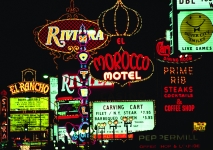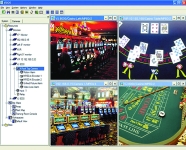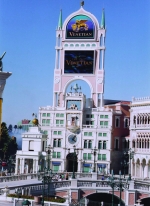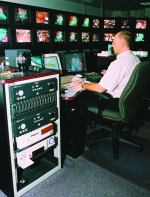

The primary task of closed-circuit television (CCTV) surveillance in a casino is to protect its visitors, employees and assets; most establishments spare no expense in installing the most sophisticated CCTV systems available.
Main issues
Compared with other buildings and complexes, casinos have unique security requirements. The combination of large crowds, huge amounts of cash on site and the threat of cheating and theft leads to a potentially volatile environment. Whether to prevent petty cheating, theft or organised crime by visitors or staff, the need for thorough and effective surveillance is a primary requirement. Surveillance acts firstly as a deterrent and secondly as a means of detection, apprehension and, ultimately, prosecution. Security staff have an important dual role here - a visible presence in the gaming areas and behind the scenes observing live and recorded video content to identify any suspicious activity. In addition, security personnel must be alert to the danger of fire, accidents, assault and the presence of underage visitors. In other words, they have a high level of responsibility, often in very crowded, smoky warm areas that means tiring work. Without CCTV surveillance, their task would be almost impossible.

Casinos range greatly in size - from relatively small facilities in a single, compact building right up to massive complexes that include shops, hotels with thousands of rooms, restaurants and vast entertainment arenas. The world's largest gaming location is, of course, Las Vegas. Attracting more than 34 million visitors annually to its 75+ casinos, the millions spent in Las Vegas on gambling and hotel accommodation is more than matched by the colossal investments made in them by owners and operators. In the UK a recent report by KPMG shows that spending on gambling will be more than EUR 3,75 billion by 2009. It is clear then, why casino owners are willing to spend substantial amounts of money to protect their investments with state-of-the-art CCTV surveillance.

Detection
The CCTV chain begins with the camera. Numerous types of camera are available today with many impressive features. Bosch offers a range of fixed, dome and pan/tilt/zoom (PTZ) models suitable for casinos. Especially applicable for low-light conditions often found in a casino, Bosch's DinionXF cameras feature XF-Dynamic, which uses 15-bit digital signal processing (DSP) technology to capture the entire dynamic range of a scene. This means that activities in areas of bright lights or in dark shadows are captured effectively. Other features, many enabled by digital technology, further enhance basic camera functionality such as miniaturisation, motion detection, day/night operation, backlight compensation, dynamic noise reduction plus remote and automatic lens control. A wide range of accessories provides mounting choices, resistance to tampering, impact and hazardous substances.

Recording and playback
Some countries, including the US, have mandatory regulations on recording speed of video content in casinos. In the US, the minimum required recording speed of a surveillance system is 20 frames per second (fps). Only digital technology can enable recording at this speed with the digital video recorder (DVR), which also allows connection of multiple cameras. There can be thousands of cameras in a large casino and the key word, therefore, is capacity. Bosch's DiBos Digital Video Recorder and Transmission System employs new compression techniques based on the MPEG-4 standard and with hard disk drive capacities of up to 600 gigabytes, enough capacity for up to 10 weeks of continuous recording. DiBos also provides tamper-proof storage that answers the legal need for preventing image editing without being detected, and the provision of video evidence in a court of law. Moreover, combining DiBos with redundant array of independent disks (RAID) disk arrays ensures duplication and retrieval of otherwise lost content in the event of system breakdown.

IP-based surveillance
The industry trend of basing CCTV surveillance systems on Internet protocol (IP) is certainly extending to casinos. In many cases the building's existing local area network (LAN), Internet or intranet can be used, adding surveillance capability for minimal cost. Where a LAN is not installed, new network cabling already costs less than coax.
The benefits are many. At the camera level, the scalability of an IP-based system grows from a single camera to thousands in single unit increments, compared with 16-camera/channel steps for DVR. In addition, any camera can be provided with any frame rate at any time, and frame rate and storage capacity can be increased simply by adding hard drives and PC servers. Moreover, IP allows 'intelligent' functionality of cameras, such as motion detection, sensor input, relay output and alarm triggering; faster systems integration allowing one network that controls audio, video and data; remote accessibility of live or stored video streams from any location, and increased reliability through realtime management software. Using Power-over-Ethernet (PoE) technology, the IP camera, or an encoder with attached analog camera, can also be powered over the network cable, providing a much easier installation.

IP-based security systems employ a networked video recorder (NVR) rather than a DVR. The NVR is an intelligent video server that feeds the data streams of all digital video sources or analog cameras into the network and stores the content on a hard disk. In addition to video, an NVR also records audio and from any camera in the system and plays back to any monitor. Bosch's VIDOS-NVR supports up to 64 video streams simultaneously over a single PC server. A most important feature of the VIDOS-NVR is Bosch's automatic network replenishment (ANR), patent-pending technology that ensures seamless and gapless video recording even in the event of network failure. Bosch also has a comprehensive range of IP encoders and decoders, including single- and multichannel models, providing highest-quality video in 4CIF resolution and full frame rate, all with maintaining high efficiency of network usage. The functionality of these encoders is further enhanced with video content analysis (VCA). Especially useful in casinos, VCA is the comparison of realtime and recorded images with a database to allow static, suspicious-object monitoring, facial recognition, behaviour recognition and people and traffic volume registration. This allows a casino to analyse its clientele and scrutinise previously identified individuals.

Complete control
Robust and versatile network control of a casino's IP-based surveillance system can greatly enhance its operation and optimise efficiency. For this, Bosch offers the Vidos Video Management System, a powerful and customisable software package that controls all functions in the IP CCTV system and supports an unlimited number of cameras and monitors. Vidos integrates with existing peripheral equipment such as dome cameras and analog monitors.

Summary
The solutions described in this article offer a limited overview of Bosch's total product offering for casinos. In addition to CCTV surveillance the company also provides a comprehensive range of innovative systems for intrusion, fire and access and sophisticated building integration. In short, Bosch is the 'one-stop-shop' for all security, safety and CCTV surveillance requirements of modern casinos, with an impressive list of more than 100 reference accounts around the world... including many on the Las Vegas Strip.

For more information contact Tony Janse, Bosch Security Systems, +27 (0) 11 651 7810, www.boschsecurity.com
| Tel: | +27 11 651 9600 |
| Email: | [email protected] |
| www: | www.boschsecurity.com/xf/en |
| Articles: | More information and articles about Bosch Building Technologies |
© Technews Publishing (Pty) Ltd. | All Rights Reserved.